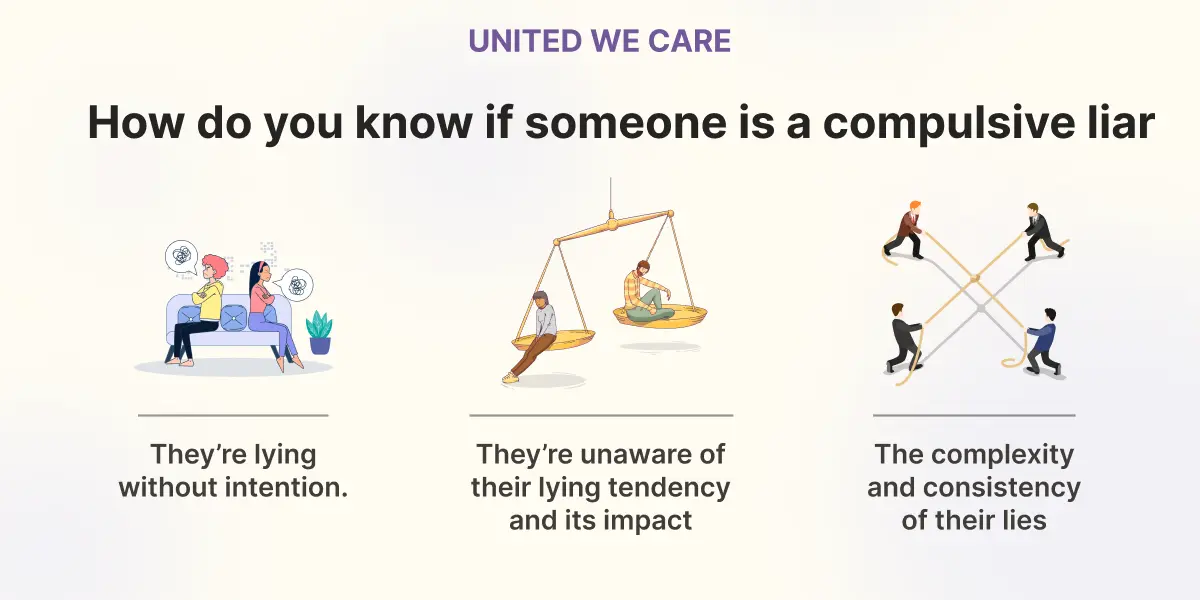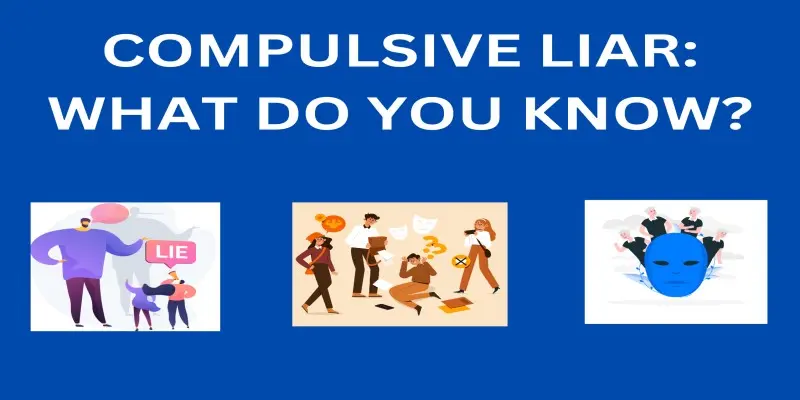Introduction
We all engage in small, white lies now and then. These lies may help us deal with a situation or protect ourselves when we’re feeling vulnerable. But sometimes, this lying might become chronic and without any particular reason. That’s when you know you’ve spotted a compulsive liar.
There are many different kinds of lies. Some lies are told to deceive others and gain some advantage.[1] Some are done with a clear purpose, such as to avoid punishment. And some, like compulsive lies, are random and automatic.
At the end of the day, any kind of lying disrupts trust. It can result in a lot of confusion and emotional chaos for the ones on the other end of the lie. So, let’s look into the roots of this complex lying behavior to learn how to deal constructively with a compulsive liar.
What is a compulsive liar?
Do you think you might be dealing with a compulsive liar? Think of your exchanges with them while you read the following story and compare for any similarities.
You’re catching up with them, and they start telling you about their day and what they’ve been up to in the past few months. They talk about having a feast for lunch, doing a work project with a top-tier brand, and their crazy backpacking adventures. You’re amazed, and as you ask them questions to know more, you find that the details of their stories keep shifting and do not add up. You gently ask them about it, but they don’t seem to remember. You feel confused about why someone would lie to you about such things.
A compulsive liar is someone who lies about small and insignificant things. Their lies and stories are random and made up in the spur of the moment. It is a coping mechanism for them to sound more impressive and feel more likable and accepted.[2]
Being on the receiving end of compulsive lying can be emotionally overwhelming. It might make you feel like you can never take their words at face value and believe them.
Compulsive lying is also linked to impulse control disorders, anxiety, and certain personality disorders.
How do you know if someone is a compulsive liar?
Some clear signs can tell you if someone is a compulsive liar. Some patterns that give away this behavior are:

- They’re lying without intention: Compulsive liars often lie without any clear purpose. Their lying is a coping mechanism and has become a habitual way for them to deal with any kind of stress or discomfort. Their lies are random and spontaneous and sometimes don’t even make sense.
- They’re unaware of their lying tendency and its impact: If you catch them in a lie and confront them, and they don’t even realize they were lying in the first place, then they’re most probably a compulsive liar. You might even observe that they’re not guilty or remorseful as they don’t realize the impact of their lies.
- The complexity and consistency of their lies: Because their lies are simple, random, and intent-less, compulsive liars often forget about what they have said and even contradict themselves.
How to deal with a compulsive liar?
When someone is constantly lying to you, remember that it’s rarely about you and almost always about them. Their lying behavior started long before your exchanges with them and has many complex roots.
- When you catch them in a lie, avoid confronting them in a volatile manner. They might become defensive and attempt to either justify or divert the attention from the situation.
- It’s not a great feeling or even fair to have to deal with dishonest behavior. However, to err is human. So, giving them the benefit of the doubt, take this opportunity to set boundaries. Communicate to them clearly the kind of behavior you will not tolerate and the consequences if it happens again.
- Remember that compulsive lying is often a result of much deeper psychological issues, so try to be empathetic as you deal with this situation.
- You can even encourage them to seek professional support from a therapist. Ultimately, you have to protect your own mental well-being, so be prepared to distance yourself from the relationship if it gets too overwhelming.
Treatment of compulsive liar
The treatment for compulsive lying primarily consists of psychotherapy. Cognitive behavioral therapy (CBT) focuses on identifying and altering thought patterns and behaviors that do not serve them to those that do. They learn to recognize their triggers for compulsive lying and work through these triggers in healthier ways.[3] Dialectical behavior therapy (DBT) is beneficial for emotional regulation and impulse control.
Group therapy offers an environment of support, and family therapy can help them reconnect and rebuild trust. If the lying has psychiatric comorbidities, medication may also be prescribed as part of a treatment plan.
On a personal level, they can create awareness about their lying nature. This will help them gauge the impacts of their lying and give them a choice to make the required changes. They may also educate themselves on the different facets of this behavior and build skills for healthier communication.
If someone is seeking support to get through their lying tendencies, you need to be patient as they make healthier changes. Encouraging them to go to therapy and practice their new honesty skills regularly can help. You can also acknowledge and celebrate small progress, which can motivate them to keep making these changes.
Conclusion
Chronic lying can affect your relationship and mental well-being to a great extent. If you’re dealing with a compulsive liar, remember that they’re lying out of habit and have no purpose behind it.
With a strategic approach, such as observation and recalling what they say, it is possible to identify compulsive lying. Psychotherapy is effective in constructively modifying this behavior. If the lying is causing immense distress to you, you must seek the support of a mental health professional as well. At United We Care, we offer the most appropriate, clinically backed solutions for all your well-being needs.
References:
[1] Hare, R.D., Forth, A.E., Hart, S.D. (1989). The Psychopath as Prototype for Pathological Lying and Deception. In: Yuille, J.C. (eds) Credibility Assessment. Nato Science, vol 47. Springer, Dordrecht. https://doi.org/10.1007/978-94-015-7856-1_2 [Accessed: 28 Oct 2023]
[2] “Compulsive Lying,” Good Therapy. [Online] Available: https://www.goodtherapy.org/blog/psychpedia/compulsive-lying [Accessed: 28 Oct 2023]
[3] Drew A. Curtis, Ph.D., and Christian L. Hart, Ph.D., “Pathological Lying: Psychotherapists’ Experiences and Ability to Diagnose,” The American Journal of Psychotherapy. [Online] Available: https://doi.org/10.1176/appi.psychotherapy.20210006 [Accessed: 28 Oct 2023]










